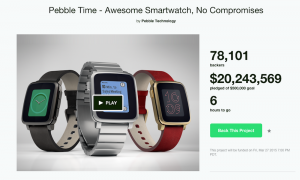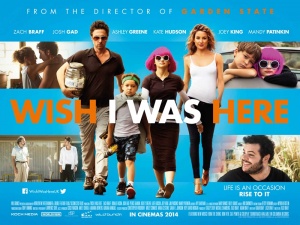Difference between revisions of "Kickstarter"
(added in zach braff's movie poster) |
|||
| Line 41: | Line 41: | ||
[[File:zachbraff.jpg|thumb|300px|right|Zach Braff used Kickstarter as a way to fund his own movie.]] | [[File:zachbraff.jpg|thumb|300px|right|Zach Braff used Kickstarter as a way to fund his own movie.]] | ||
Other notable controversies occur when celebrities turn to the crowdfunding platform to raise money for their own ventures. Notable program names like Veronica Mars and Zach Braff’s ''Wish I Was Here'' received scrutiny because many believe big names like these keep eyes off of the indie artists and creators the website was initially designed to help. | Other notable controversies occur when celebrities turn to the crowdfunding platform to raise money for their own ventures. Notable program names like Veronica Mars and Zach Braff’s ''Wish I Was Here'' received scrutiny because many believe big names like these keep eyes off of the indie artists and creators the website was initially designed to help. | ||
| + | |||
| + | ==Is this really crowdfunding?== | ||
| + | Kickstarter is mainly known as a crowd funding platform, used to reach goal amounts of money for business investment. However, as it has progressed over the years, it has become less a crowd funding platform and more as a pre-order store <ref>http://www.huffingtonpost.com/chris-shuptrine/kickstarter-crowdfunding-_b_9609322.html</ref>. Crowd funding is the process of raising investments from a large number of people to reach an ultimate goal <ref>https://en.wikipedia.org/wiki/Crowdfunding</ref>. In the article, it references the Kickstarter campaign of Pebble, which was able to raise over 20 million dollars with over 80 thousand investors. If that many people are interested in a product, the kickstarter campaign could have been used to create hype around the product, and less of a crowdfunding venture. Since so many people were intrigued by the product, it seems like they wouldn't have needed that much money from random outsourcing. This is not against the rules, but rather sheds light on other uses of kickstarter, some that could possibly interfere with information ethics. | ||
==Ethical Implications== | ==Ethical Implications== | ||
| Line 47: | Line 50: | ||
Another ethical issue that could arise would be what type of projects are allowed to be funded? What about a pro-abortion group wanting to raise funds for a public project? What about a hate-group? Who determines what should be ethically allowed on Kickstarter? Immense monitoring must take place to ensure Kickstarter remains in a good light but as times change, so does the level and understanding of what is acceptable. | Another ethical issue that could arise would be what type of projects are allowed to be funded? What about a pro-abortion group wanting to raise funds for a public project? What about a hate-group? Who determines what should be ethically allowed on Kickstarter? Immense monitoring must take place to ensure Kickstarter remains in a good light but as times change, so does the level and understanding of what is acceptable. | ||
| + | |||
| + | |||
==References== | ==References== | ||
Revision as of 17:49, 12 April 2016
|
Backers, or supporters, of Kickstarter campaigns are often given some reward proportional to the projects that they are backing (ex. A $1 backing could warrant a sticker while a $100 backing could pre-order the product at an exclusive price). These projects fall into a variety of categories such as: Arts, Crafts, Design, Technology, Fashion, Film & Video, Music, Photography and Journalism.
Contents
History
Kickstarter was launched in Brooklyn, NY on April 29, 2009 by Perry Chen, Yancey Strickler, and Charles Adler[2] It gained notoriety quickly through the press because of its simplified crowdfunding process and massive earning potential. It raised over $10 million in funding from investors like Jack Dorsey, Thrive Capital, and Chris Sacca as well as 16 others.[3] Once a web-only platform, Kickstarter released an iPhone app of the same name in February of 2013 to bring backing projects into the hands of consumers everywhere. It has continued to grow and is known as one of the staple crowdfunding platforms in the world.
Model
Kickstarter was so unique in the first place because it allowed everyday people to become investors in potential companies before they are real companies. Before platforms like Kickstarter arose it took a lot of money to invest in any kind of business. Now with Kickstarter's staggered backings and rewards, anyone can theoretically invest any amount they want into a company and receive benefits in gifts rather than equity.
Kickstarter applies a 5% fee to raised funds (but only if the project’s goal is reached), as well as a 3-5% fee for the payment processing. However, project owners keep 100% of their work and Kickstarter owns none of it.[4]
Projects & Statistics
Kickstarter has facilitated over 100,000 successful projects for a total of $1.91 billion in pledged funds to those projects to date. This is out of 283,000+ potential projects with a 36.19% success rate among projects on the site.[5] Kickstarter has seen steady improvement in participation both from project developers as well as backers each year since 2009.
There have been several milestones along the way for Kickstarter. In 2012 they reached their first project with over $1,000,000 pledged ($1,464,7076 pledged of a $75,000 goal) for an iPhone dock called Elevation Dock.[6] Since then there have been three projects that have broken the $10,000,000 in pledges: Pebble Time, The Coolest Cooler, and Pebble: E-Paper Watch.[7] Most successful projects on Kickstarter however earn between $1,000 and $9,999. While not all projects are successfully funded on Kickstarter – meaning that the creators will receive none of the pledged funds – 78% of projects that raise at least 20% of their goal are originally funded.[8]
Controversy on Kickstarter
Most of Kickstarter’s campaigns are created by honest people looking for a way to break into the industry and get their name out there however possible. Some people, however, have attempted to take advantage of the system and exploit Kickstarter's access to potential backers. In the summer of 2014, a man started a campaign to raise $10 to make a potato salad. The ridiculousness of the request gained attention online and donations began to pour in. The pledging topped off at around $40,000 when it ended.[9] Many accused him of exploiting the system, requesting him to donate the money raised to charity.
Other notable controversies occur when celebrities turn to the crowdfunding platform to raise money for their own ventures. Notable program names like Veronica Mars and Zach Braff’s Wish I Was Here received scrutiny because many believe big names like these keep eyes off of the indie artists and creators the website was initially designed to help.
Is this really crowdfunding?
Kickstarter is mainly known as a crowd funding platform, used to reach goal amounts of money for business investment. However, as it has progressed over the years, it has become less a crowd funding platform and more as a pre-order store [10]. Crowd funding is the process of raising investments from a large number of people to reach an ultimate goal [11]. In the article, it references the Kickstarter campaign of Pebble, which was able to raise over 20 million dollars with over 80 thousand investors. If that many people are interested in a product, the kickstarter campaign could have been used to create hype around the product, and less of a crowdfunding venture. Since so many people were intrigued by the product, it seems like they wouldn't have needed that much money from random outsourcing. This is not against the rules, but rather sheds light on other uses of kickstarter, some that could possibly interfere with information ethics.
Ethical Implications
Kickstarter is designed to be a very transparent system. Creators start a project, backers fund it, and then backers are supposed to get updated on the progress of their project and receive whatever their reward was for backing. Ideally this system, when followed, wouldn’t produce too many ethical dilemmas. However, that is not always the case. One ethical issue could be who is allowed to be a creator. Controversy emerged from Zach Braff’s campaign to raise $2M for his project when it was obvious that he could completely fund it himself.[12] While this could pose the ethical question: should there be stricter regulations on who asks for funding, that ignores the other value that Kickstarter brings to creator such as measuring market demand.
Another ethical issue that could arise would be what type of projects are allowed to be funded? What about a pro-abortion group wanting to raise funds for a public project? What about a hate-group? Who determines what should be ethically allowed on Kickstarter? Immense monitoring must take place to ensure Kickstarter remains in a good light but as times change, so does the level and understanding of what is acceptable.
References
- ↑ https://www.kickstarter.com/about
- ↑ http://techcrunch.com/2009/04/29/kickstarter-launches-another-social-fundraising-platform/
- ↑ https://www.crunchbase.com/organization/kickstarter/investors
- ↑ https://www.kickstarter.com/learn
- ↑ https://www.kickstarter.com/help/stats
- ↑ https://www.kickstarter.com/projects/hop/elevation-dock-the-best-dock-for-iphone
- ↑ https://www.kickstarter.com/discover/advanced?sort=most_funded
- ↑ https://www.kickstarter.com/help/stats
- ↑ http://www.avclub.com/article/guy-who-raised-40000-make-potato-salad-attracting--206755
- ↑ http://www.huffingtonpost.com/chris-shuptrine/kickstarter-crowdfunding-_b_9609322.html
- ↑ https://en.wikipedia.org/wiki/Crowdfunding
- ↑ http://www.nytimes.com/2013/05/26/magazine/was-it-ethical-for-zach-braff-to-take-to-kickstarter.html?_r=0


